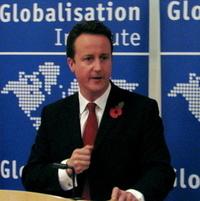
(Photo credit: Wikipedia)
We were all taken by surprise last Thursday when David Cameron walked out of cross-party talks on the implementation of the Levenson Inquiry’s recommendations, but it was Ed Miliband and Nick Clegg who were apparently caught most off-guard by the move.
The Levenson Inquiry, as most people in the UK will know, was launched in order to provide a permanent solution to the problem of weak press regulation which allowed journalists at the now defunct Murdoch-owned tabloid, The News of The World, to carelessly hack the voicemail accounts of hundreds of people and foster corrupt relations with various senior police officers. Levenson concluded that a system of self-regulation of the press must be underpinned by Parliamentary legislation was the best way of achieving a balance between freedom of the press and protection of the public.
Initially, the Conservative Party leadership, which has famously close relations with Rupert Murdoch, refused to consider any legislation, while Labour accepted Levenson’s proposals in full. The positions seemed completely reconcilable. As of today, they still haven’t been reconciled, but both sides have made concessions. controversially, Nick Clegg and Ed Miliband published their own plans in direct opposition to David Cameron, and the two different plans will be put to a vote shortly.
Both sides are now agreed that a Royal Charter should be drawn up,which is a statutory framework that has been described as “legislation-lite”. Royal Charters have been used for a number of markets and organisations in Britain, with the best-known example being the one which has governed the BBC for several decades. However, the Labour and Liberal Democrat proposals would also see an Act of Parliament strengthening the regulator established by the Charter and making membership mandatory, unlike the existing Press Council (The Daily Star, Express, and Sport are all newspapers who have opted out of the creaking scheme).
We are likely to see a nail-bitingly tight vote in a few days’ time. With the major parties imposing three-line whips on their MPs (the strongest possible direction that Whips issue) , the outcome will be decided by the votes of those bold enough to rebel, SNP, Plaid Cymru, Green, Independent and Northern Ireland party MPs. The “press barons” have generally been friendly to the SNP, but have much to fear from the other parties, whom they have often marginalised, belittled and mocked, with definite effect.
This country has a 50:50 chance of finally standing up to billionaire newspaper proprietors who have, for well over a century, been given a disproportionate level of influence over a crucial supply of information to the general public, and so ultimately the way in which our country is governed. However, little has been said by Messrs Miliband or Clegg about curbing their power: the focus has been on preventing their journalists breaking the law. It therefore seems that all that is really being done is the superficial tackling of one symptom of a deeper-rooted problem. Only when the much discussed “one man [proprietor], one newspaper” rule becomes law willl we have newspaper executives modest enough to realize that they do not run the country.

